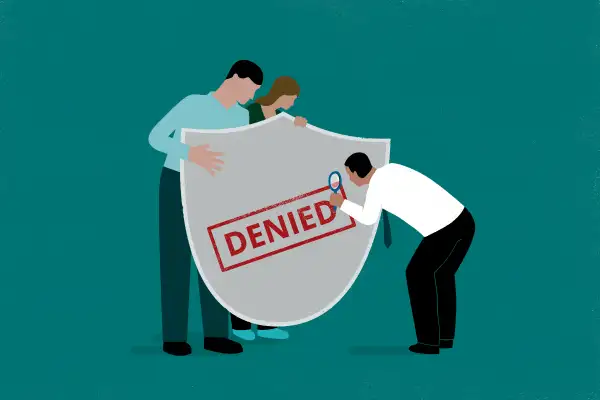Life Insurance Claim Denied? Hiring a Lawyer Might Help

If your life insurance claim has been denied, and your own efforts with the insurer have failed, it’s time to consider engaging a lawyer. Getting legal representation to fight a claim needn't be costly, at least upfront, but the litigation process may take a toll in time and stress, say experts.
It’s relatively rare to run into trouble when settling a life insurance claim, but when it happens the experience is naturally upsetting and even bewildering. Justin Lovely, the founder of The Lovely Law Firm in Myrtle Beach, South Carolina, says “there are so many reasons life insurance claims get denied. That’s why it's worth your time to investigate whether the reasoning for denial [and] if it's something a lawyer can assist you with.”
Indeed, the advantages to hiring a good lawyer include getting expert advice on whether “the dispute is...worth pursuing,” says Joan M. Burda, Adjunct Professor at the Case Western Reserve University School of Law. A lawyer, she says, can gauge the likelihood of legal action paying off.
Here’s what you need to know about the process of hiring a lawyer to help settle a life insurance claim, including the possible costs in money and time.
How much does a lawyer cost?
You can pay for representation in a range of ways, depending on your financial circumstances and the case, according to Lovely. You can pay by an hourly rate if you want, he says, but notes that “[m]any clients are not prepared to put up attorney fees and costs on the front end.”
A common arrangement, then, is that an initial consultation is free of charge and then the case, if pursued, is handled on a contingency basis. A standard contingency would be one-third, or near that, of the policy’s death benefit,” Lovely says. “The lawyer assumes the risk of nonpayment and the client benefits by not having to ‘front’ expensive hourly rates.”
Burda confirms that the one-third proportion is fairly standard, but also says the client and their attorney usually agree on the exact percentage together. Keep in mind, she adds, that the contingency covers not only the attorney fees, but those for court costs and litigation expenses, such as court filing fees or research.
While what representation will cost is obviously an important criterion, Burda says your main priorities in looking for a lawyer should be the ability to explain things to you in a way you can understand, and an appropriate background in insurance.
A number of attorneys specialize in insurance -- and some even life insurance specifically. They can be reached either directly through recommendations or a Google search. Sites such LifeAttorney.com both refer you to representatives and provide useful information, such as why life insurance claims may be denied.
How long does it take to fight a claim denial?
The first step a lawyer will take is rarely to launch formal legal action on your behalf. “Filing a lawsuit should be a last step, not the first,” says Burda. “Often these claims can be resolved by [a lawyer] getting the proper documentation and presenting the appropriate legal arguments supporting the claim,” she says.
If you’re so fortunate, settlement may come fairly quickly. “If a lawyer can quickly convince the insurance company to tender the policy, the process may be as short as a couple of months,” says Lovely.
But of course, sometimes it's not so easy. As Lovely puts it, “unfortunately, you cannot count on the insurance companies to do the right thing.” And sometimes the calendar forces the lawyer’s hand, says Burda. If the statute of limitations, meaning the time limit within which a lawsuit must be filed, is approaching, she says, “litigation may be the only way to try to resolve the matter” in a timely manner.
And once legal action is launched, all bets are off on how quickly the suit may be settled. And unfortunately, Burda says, insurance cases are yet another thing whose timing has been hampered by the pandemic. ‘If litigation is necessary, you are now looking at several years, due to how COVID-19 has seriously backlogged our courts.”
How likely am I to succeed?
It's fair to wonder how likely you are to prevail in your case. Unfortunately, there's no dependable way to know that.
The variables at play in any claim that goes to court are so varied, says Burda, that “no good lawyer will ever predict an outcome. In fact, if the lawyer does, find another lawyer. There are no guarantees, and clients need to be aware of that fact.”
Apart from the possible cost of action, in the event that payment isn’t on a contingency basis, Burda warns of the emotional toll a lengthy claim can take. “Clients also must decide how they feel about a process that may continue for a considerable time,” says Burda.
Your resolve may be hardened, though, by the strength of the case itself. “If an insurer is acting in bad faith, a claimant may recover more than the face value of the policy,” Burda points out.
Before hiring a lawyer and risking losing a third of the death benefit to their fees, make sure you’ve exhausted all the DIY options to fight a denial. For further advice on what to say on your appeal, the Consumer Federation of America helps prevent unfair practices by insurance companies, has resources and advice for the process, and it might be worth it to contact your state insurance commissioners offices.
More from Money:
The Best Life Insurance Companies of 2023
How to Buy Life Insurance Online
Life Insurance Companies Sometimes Deny Claims. Prevent That From Happening to Your Family